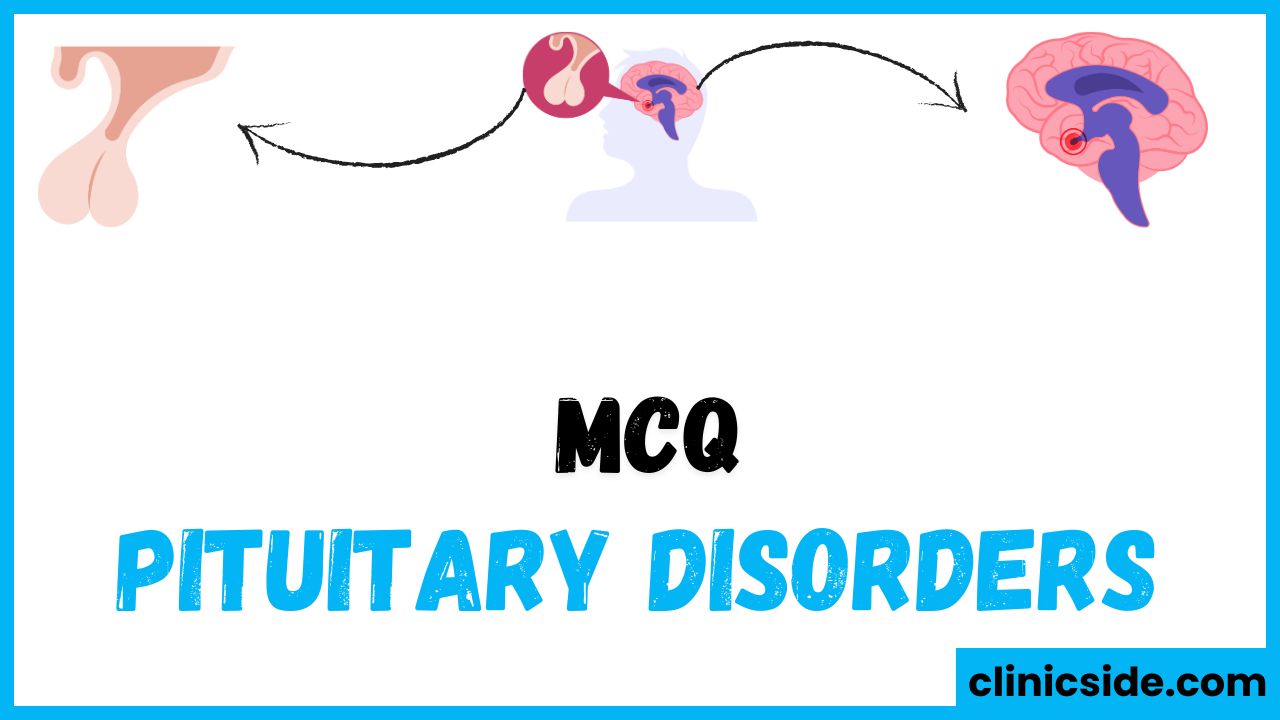Quiz
Available options: 1 to 20
Summary of MCQs on Drugs for Pituitary Disorders
Dopamine Agonists for Prolactinoma Treatment
Prolactinoma, a benign tumor of the pituitary gland, is primarily treated with dopamine agonists, such as Bromocriptine and Cabergoline. These drugs work by stimulating dopamine receptors in the brain, which reduces prolactin production. As a result, prolactinoma size can decrease, and symptoms such as irregular periods or infertility are improved. These medications are commonly considered the first-line treatment for prolactinoma.
Desmopressin in Central Diabetes Insipidus
In patients with central diabetes insipidus, which occurs when the body cannot produce enough vasopressin (antidiuretic hormone), Desmopressin is used. This synthetic hormone mimics vasopressin’s action by activating V2 receptors in the kidneys, aiding in water retention. This treatment is crucial for managing the excessive thirst and urination caused by the condition. Desmopressin is also useful for managing nocturnal enuresis (bedwetting) in children.
Somatostatin Analogs: Octreotide for Acromegaly
Somatostatin analogs, including Octreotide, play an important role in the treatment of acromegaly, a condition caused by excessive growth hormone secretion. Octreotide mimics natural somatostatin, inhibiting growth hormone release from the pituitary gland. In addition to treating acromegaly, it is also used for certain neuroendocrine tumors, where it helps manage symptoms such as diarrhea and flushing.
Growth Hormone Deficiency: Somatropin
For growth hormone deficiency in children, Somatropin, a synthetic form of growth hormone, is the preferred treatment. It helps stimulate growth and assists children with short stature, particularly those with conditions like Turner syndrome or congenital growth hormone deficiency. Somatropin ensures proper physical development by promoting bone growth and metabolic functions.
Cabergoline’s Role in Hyperprolactinemia
Cabergoline is another dopamine agonist that is highly effective in managing hyperprolactinemia, a condition where the body produces too much prolactin. By stimulating dopamine receptors, Cabergoline helps lower prolactin levels, which can restore menstrual cycles, improve fertility, and address issues like galactorrhea. It is a long-acting medication with fewer side effects than other dopamine agonists.
Side Effects of Somatostatin Analogs
While Octreotide and other somatostatin analogs are helpful in treating endocrine disorders, they can have side effects. One common issue is the formation of gallstones, which can develop due to the drug’s impact on the digestive system. These analogs can also lead to gastrointestinal discomfort, including nausea and abdominal cramping. Monitoring for these side effects is essential during long-term treatment.
Tolvaptan: Vasopressin Receptor Antagonist for SIADH
Tolvaptan is a medication used to treat Syndrome of Inappropriate Antidiuretic Hormone Secretion (SIADH), where excessive antidiuretic hormone leads to water retention and low sodium levels. By acting as a vasopressin receptor antagonist, Tolvaptan blocks the V2 receptors in the kidneys, helping to correct the water balance and reduce hyponatremia. It is an important tool in managing SIADH, particularly in hospitalized patients.
Pegvisomant in Acromegaly Treatment
For acromegaly, Pegvisomant provides a unique approach. Instead of inhibiting growth hormone secretion, Pegvisomant works by blocking IGF-1 receptors, which are responsible for many of the growth-promoting effects of growth hormone. This treatment helps to reduce the symptoms of acromegaly, such as enlarged hands and feet, and helps improve quality of life for patients who are unresponsive to other therapies.
Pasireotide for Cushing’s Disease and Acromegaly
Pasireotide is another somatostatin analog used for managing Cushing’s disease, where excess ACTH causes an overproduction of cortisol, as well as acromegaly. It works by inhibiting the secretion of both growth hormone and ACTH, offering a treatment option for patients who do not respond well to other therapies. Pasireotide helps normalize hormone levels and manage symptoms of these disorders.
Common Side Effects of Endocrine Medications
The drugs used for treating endocrine disorders can cause a variety of side effects. For example, Cabergoline can cause nausea, especially during the initiation of therapy. Gallstones are a known side effect of somatostatin analogs, such as Octreotide. Additionally, Tolvaptan can cause hyponatremia if not monitored carefully. Long-term use of Desmopressin can lead to water intoxication, which can be dangerous. It is crucial to monitor these side effects to adjust treatment as needed.
Conclusion
Medications for treating endocrine disorders, such as dopamine agonists for prolactinoma and somatostatin analogs for acromegaly, play essential roles in controlling hormone imbalances. Drugs like Desmopressin are vital for managing conditions like central diabetes insipidus, while Pegvisomant and Pasireotide offer specialized treatments for acromegaly and Cushing’s disease. However, these medications come with potential side effects that must be managed, such as gallstones or nausea. Proper understanding and monitoring of these drugs ensure that patients receive the most effective treatment while minimizing risks.





